9 june 2019
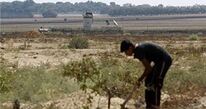
The Israeli occupation forces (IOF) on Sunday morning opened fire at Palestinian farmers and shepherds in the south of the Gaza Strip.
According to eyewitnesses, soldiers opened fire from watchtowers and on the ground at a group of farmers and shepherds in the east of Khan Younis and the southeast of Rafah.
Luckily, no one was injured in the shooting attacks.
According to eyewitnesses, soldiers opened fire from watchtowers and on the ground at a group of farmers and shepherds in the east of Khan Younis and the southeast of Rafah.
Luckily, no one was injured in the shooting attacks.
7 june 2019

The Chief Military Advocate General of the Israeli army, Sharon Afek, and the US Department of Defense General Counsel, Paul Ney, shared a platform at the ‘International Conference on the Law of Armed Conflict’, which took place in Herzliya, Israel between May 28-30.
Their panel witnessed some of the most misconstrued interpretations of international law ever recorded. It was as if Afek and Ney were making up their law on warfare and armed conflict, with no regard to what international law stipulates.
Unsurprisingly, both Afek and Ney agreed on many things, including that Israel and the US are blameless in all of their military conflicts, and that they will always be united against any attempt to hold them accountable for war crimes by the International Court of Justice (ICC).
Their tirade against the ICC mirrors that of their leaders. While Israeli Prime Minister Benjamin Netanyahu’s anti-ICC position is familiar, last April, US President Donald Trump virulently expressed his contempt for the global organisation and everything it represents.
“Any attempt to target American, Israeli, or allied personnel for prosecution will be met with a swift and vigorous response,” Trump said in writing on April 12.
While Trump’s (and Netanyahu’s) divisive language is nothing new, Afek and Ney was entrusted with the difficult task of using legal language to explain their countries’ aversion for international law.
Before the Herzliya Conference, Afek addressed the Israel Bar Association convention in Eilat on May 26. Here, too, he made some outlandish claims as he absolved, in advance, Israeli soldiers who kill Palestinians.
“A soldier who is in a life-threatening situation and acts to defend himself (or) others (he) is responsible for, is receiving and will continue receiving full back-up from the Israeli army,” he said.
The above assertion appears far more sinister once we remember Afek’s views on what constitutes a “life-threatening situation”, as he had articulated in Herzliya a few days later.
“Thousands of Gaza’s residents (try) to breach the border fence,” he said, concerning the non-violent March of Return at the fence separating besieged Gaza from Israel.
“The Israel Defense Forces military advocate general, Maj. Gen. Sharon Afek, and the general counsel of the U.S. Department of Defense, Paul Ney:
The International Criminal Court in The Hague has no jurisdiction to deal with our military conduct. https://t.co/VT0w4qUSZD”
— Bassam Shweiki (@BassamShweiki) May 31, 2019
The Gaza protesters “are led by a terrorist organisation that deliberately uses civilians to carry out attacks,” Afek said.
Afek sees unarmed protests in Gaza as a form of terrorism, thus concurring with an earlier statement made by then-Israeli Defense Minister, Avigdor Lieberman, on April 8, 2018, when he declared that “there are no innocents in Gaza.”
Israel’s shoot-to-kill policy, however, is not confined to the Gaza Strip but is also implemented with the same degree of violent enthusiasm in the West Bank.
‘No attacker, male or female, should make it out of any attack alive,’ Lieberman said in 2015. His orders were followed implicitly, as hundreds of Palestinians were killed in the West Bank and Jerusalem for allegedly trying to attack Israeli occupation soldiers or armed illegal Jewish settlers.
Unlike democratic political systems everywhere, in Israel, the occupation soldier becomes the interpreter and enforcer of the law.
Putting this policy into practice in Gaza is even more horrendous as Israeli snipers are often killing unarmed protesters from long distances.
Even journalists and medics have not been spared the same tragic fate as the hundreds of civilians who were killed since the start of the protests in March 2018.
Last February, the United Nations Independent Commission of Inquiry on Gaza’s protests concluded that “it has reasonable grounds to believe that during the Great March of Return, Israeli soldiers committed violations of international human rights and humanitarian law. Some of those violations may constitute war crimes or crimes against humanity, and must be immediately investigated by Israel.”
In his attack on the ICC at the Herzliya Conference, Afek contended that “Israel is a law-abiding country, with an independent and strong judicial system, and there is no reason for its actions to be scrutinised by the ICC.”
The Israeli General goes on to reprimand the ICC by urging it to focus on “dealing with the main issues for which it was founded.”
Has Afek even read the Rome Statute? The first Article states that the ICC has the “power to exercise its jurisdiction over persons for the most serious crimes of international concern, as referred to in this Statute.”
Article 5 elaborates the nature of these serious crimes, which include: “(a) The crime of genocide; (b) Crimes against humanity; (c) War crimes; (d) The crime of aggression.”
Israel has been accused of at least two of these crimes – war crimes and crimes against humanity – repeatedly, including in the February report by the United Nations Independent Commission of Inquiry.
Afek may argue that none of this is relevant to Israel, for the latter is not “a party to the Rome Statute,” therefore, does not fall within ICC’s legal jurisdiction.
Wrong again.
Article 12 [pdf] of the Rome Statute allows for ICC’s jurisdiction in two cases; first, if the State in which the alleged crime has occurred is itself a party of the Statute and, second, if the State where the crime has occurred agrees to submit itself to the jurisdiction of the court.
While it is true that Israel is not a signatory of the Rome Statute, Palestine has, since 2015, agreed to submit itself to the ICC’s jurisdiction.
Moreover, in April 2015, the State of Palestine formally became a member of the ICC, thus giving the court jurisdiction to investigate crimes committed in the Occupied Territories since June 13 2014. These crimes include human rights violations carried out during the Israeli war on Gaza in July-August of the same year.
Afek’s skewed understanding of international law went unchallenged at the Herzliya Conference, as equally misguided interpreters of international law flanked him.
However, nothing proclaimed by Israel’s top military prosecutor or his government will alter the facts. Israeli war crimes must not go unpunished; Israel’s judicial system is untrustworthy, and the ICC has the legal right and moral duty to carry out the will of the international community and hold to account those responsible for war crimes anywhere, including Israel.
~ Middle East Monitor/Days of Palestine
(Ramzy Baroud has been writing about the Middle East for over 20 years. He is an internationally-syndicated columnist, a media consultant, an author of several books the last of which is “My Father Was a Freedom Fighter: Gaza’s Untold Story.”)
Their panel witnessed some of the most misconstrued interpretations of international law ever recorded. It was as if Afek and Ney were making up their law on warfare and armed conflict, with no regard to what international law stipulates.
Unsurprisingly, both Afek and Ney agreed on many things, including that Israel and the US are blameless in all of their military conflicts, and that they will always be united against any attempt to hold them accountable for war crimes by the International Court of Justice (ICC).
Their tirade against the ICC mirrors that of their leaders. While Israeli Prime Minister Benjamin Netanyahu’s anti-ICC position is familiar, last April, US President Donald Trump virulently expressed his contempt for the global organisation and everything it represents.
“Any attempt to target American, Israeli, or allied personnel for prosecution will be met with a swift and vigorous response,” Trump said in writing on April 12.
While Trump’s (and Netanyahu’s) divisive language is nothing new, Afek and Ney was entrusted with the difficult task of using legal language to explain their countries’ aversion for international law.
Before the Herzliya Conference, Afek addressed the Israel Bar Association convention in Eilat on May 26. Here, too, he made some outlandish claims as he absolved, in advance, Israeli soldiers who kill Palestinians.
“A soldier who is in a life-threatening situation and acts to defend himself (or) others (he) is responsible for, is receiving and will continue receiving full back-up from the Israeli army,” he said.
The above assertion appears far more sinister once we remember Afek’s views on what constitutes a “life-threatening situation”, as he had articulated in Herzliya a few days later.
“Thousands of Gaza’s residents (try) to breach the border fence,” he said, concerning the non-violent March of Return at the fence separating besieged Gaza from Israel.
“The Israel Defense Forces military advocate general, Maj. Gen. Sharon Afek, and the general counsel of the U.S. Department of Defense, Paul Ney:
The International Criminal Court in The Hague has no jurisdiction to deal with our military conduct. https://t.co/VT0w4qUSZD”
— Bassam Shweiki (@BassamShweiki) May 31, 2019
The Gaza protesters “are led by a terrorist organisation that deliberately uses civilians to carry out attacks,” Afek said.
Afek sees unarmed protests in Gaza as a form of terrorism, thus concurring with an earlier statement made by then-Israeli Defense Minister, Avigdor Lieberman, on April 8, 2018, when he declared that “there are no innocents in Gaza.”
Israel’s shoot-to-kill policy, however, is not confined to the Gaza Strip but is also implemented with the same degree of violent enthusiasm in the West Bank.
‘No attacker, male or female, should make it out of any attack alive,’ Lieberman said in 2015. His orders were followed implicitly, as hundreds of Palestinians were killed in the West Bank and Jerusalem for allegedly trying to attack Israeli occupation soldiers or armed illegal Jewish settlers.
Unlike democratic political systems everywhere, in Israel, the occupation soldier becomes the interpreter and enforcer of the law.
Putting this policy into practice in Gaza is even more horrendous as Israeli snipers are often killing unarmed protesters from long distances.
Even journalists and medics have not been spared the same tragic fate as the hundreds of civilians who were killed since the start of the protests in March 2018.
Last February, the United Nations Independent Commission of Inquiry on Gaza’s protests concluded that “it has reasonable grounds to believe that during the Great March of Return, Israeli soldiers committed violations of international human rights and humanitarian law. Some of those violations may constitute war crimes or crimes against humanity, and must be immediately investigated by Israel.”
In his attack on the ICC at the Herzliya Conference, Afek contended that “Israel is a law-abiding country, with an independent and strong judicial system, and there is no reason for its actions to be scrutinised by the ICC.”
The Israeli General goes on to reprimand the ICC by urging it to focus on “dealing with the main issues for which it was founded.”
Has Afek even read the Rome Statute? The first Article states that the ICC has the “power to exercise its jurisdiction over persons for the most serious crimes of international concern, as referred to in this Statute.”
Article 5 elaborates the nature of these serious crimes, which include: “(a) The crime of genocide; (b) Crimes against humanity; (c) War crimes; (d) The crime of aggression.”
Israel has been accused of at least two of these crimes – war crimes and crimes against humanity – repeatedly, including in the February report by the United Nations Independent Commission of Inquiry.
Afek may argue that none of this is relevant to Israel, for the latter is not “a party to the Rome Statute,” therefore, does not fall within ICC’s legal jurisdiction.
Wrong again.
Article 12 [pdf] of the Rome Statute allows for ICC’s jurisdiction in two cases; first, if the State in which the alleged crime has occurred is itself a party of the Statute and, second, if the State where the crime has occurred agrees to submit itself to the jurisdiction of the court.
While it is true that Israel is not a signatory of the Rome Statute, Palestine has, since 2015, agreed to submit itself to the ICC’s jurisdiction.
Moreover, in April 2015, the State of Palestine formally became a member of the ICC, thus giving the court jurisdiction to investigate crimes committed in the Occupied Territories since June 13 2014. These crimes include human rights violations carried out during the Israeli war on Gaza in July-August of the same year.
Afek’s skewed understanding of international law went unchallenged at the Herzliya Conference, as equally misguided interpreters of international law flanked him.
However, nothing proclaimed by Israel’s top military prosecutor or his government will alter the facts. Israeli war crimes must not go unpunished; Israel’s judicial system is untrustworthy, and the ICC has the legal right and moral duty to carry out the will of the international community and hold to account those responsible for war crimes anywhere, including Israel.
~ Middle East Monitor/Days of Palestine
(Ramzy Baroud has been writing about the Middle East for over 20 years. He is an internationally-syndicated columnist, a media consultant, an author of several books the last of which is “My Father Was a Freedom Fighter: Gaza’s Untold Story.”)
4 june 2019
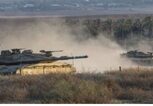
Several Israeli army vehicles carried out, on Tuesday morning, Palestinian agricultural lands east of Rafah, in the southern part of the Gaza Strip.
Media sources said the invasion was carried out by four armored military bulldozers, before they advanced dozens of meters into the lands in the Nahda neighborhood, east of Rafah.
They added that the soldiers leveled sections of the invaded lands, especially near the perimeter fence, while military drones flew overhead.
The invaded area is one of many lands near the fence that are subject to repeated invasions, which also include bulldozing and uprooting them.
Media sources said the invasion was carried out by four armored military bulldozers, before they advanced dozens of meters into the lands in the Nahda neighborhood, east of Rafah.
They added that the soldiers leveled sections of the invaded lands, especially near the perimeter fence, while military drones flew overhead.
The invaded area is one of many lands near the fence that are subject to repeated invasions, which also include bulldozing and uprooting them.
31 may 2019
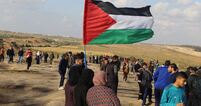
A number of Palestinian citizens were injured on Friday when the Israeli occupation forces opened fire at the peaceful demonstrators taking part in the Great March of Return in the Gaza Strip.
The PIC reporter said, quoting the Ministry of Health, that 11 Palestinians were injured by Israeli gunfire, while dozens others choked on tear gas.
Hundreds of Palestinians marched along the border between the Gaza Strip and the 1948 occupied territories on the 60th Friday of the Great March of Return to mark the International Quds Day.
The Palestinians of the Gaza Strip on 30 March 2018 launched the Great March of Return to demand the refugees' right of return and call for an end to the blockade on the coastal enclave.
Since the start of the border protests, the Israeli occupation army has killed 317 Palestinians and injured over 31,000.
The PIC reporter said, quoting the Ministry of Health, that 11 Palestinians were injured by Israeli gunfire, while dozens others choked on tear gas.
Hundreds of Palestinians marched along the border between the Gaza Strip and the 1948 occupied territories on the 60th Friday of the Great March of Return to mark the International Quds Day.
The Palestinians of the Gaza Strip on 30 March 2018 launched the Great March of Return to demand the refugees' right of return and call for an end to the blockade on the coastal enclave.
Since the start of the border protests, the Israeli occupation army has killed 317 Palestinians and injured over 31,000.
26 may 2019
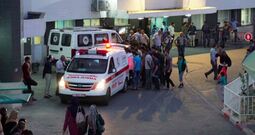
Two Palestinian young men suffered bullet injuries on Sunday morning during their presence in a border area to the east of Khan Younis, south of the Gaza Strip.
A reporter for the Palestinian Information Center (PIC) said that Israeli soldiers opened fire from watchtowers behind the security fence at two young men during their presence in the area between al-Qarrara and New Abasan, east of Khan Younis.
One of the young man suffered a bullet injury in his belly while the other was injured in one of his legs. The two wounded youths were transferred to the European Gaza Hospital.
A reporter for the Palestinian Information Center (PIC) said that Israeli soldiers opened fire from watchtowers behind the security fence at two young men during their presence in the area between al-Qarrara and New Abasan, east of Khan Younis.
One of the young man suffered a bullet injury in his belly while the other was injured in one of his legs. The two wounded youths were transferred to the European Gaza Hospital.
25 may 2019
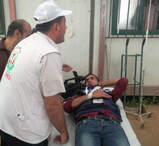
The Palestinian Health Ministry has reported that Israeli soldiers injured, Friday, sixteen Palestinians during the Great Return March processions, ongoing for the 59th week, in the besieged Gaza Strip.
The Health Ministry in Gaza said the injuries varied between rubber-coated steel bullets and gas inhalation, including some who were shot with high-velocity gas bombs.
It added that a journalist, and a female medic volunteer, were among the injured Palestinians.
All the wounded Palestinians received the needed treatment in make-shift clinics, without the needed to move them to hospitals.
Israeli soldiers have killed 307 Palestinians, including medics and journalists, and injured more than 29000, since the Great Return March procession started in the Gaza Strip, on Palestinian land Day, March 30th, 2018.
The Health Ministry in Gaza said the injuries varied between rubber-coated steel bullets and gas inhalation, including some who were shot with high-velocity gas bombs.
It added that a journalist, and a female medic volunteer, were among the injured Palestinians.
All the wounded Palestinians received the needed treatment in make-shift clinics, without the needed to move them to hospitals.
Israeli soldiers have killed 307 Palestinians, including medics and journalists, and injured more than 29000, since the Great Return March procession started in the Gaza Strip, on Palestinian land Day, March 30th, 2018.
22 may 2019

The Israeli occupation navy on Wednesday morning opened machinegun fire at Palestinian fishermen and their boats off the coast of the Gaza Strip.
Although the Israeli army extended the permitted fishing areas off the shores of Gaza up to 15 nautical miles and deployed buoys as marks for fishermen, but its naval forces opened fire once again at Palestinian fishermen during their work within 4 nautical miles off the coast of Beit Lahia, north of Gaza.
Luckily, no one was hurt in the wanton shooting attack.
According to the fishermen committees, several Israeli gunboats were seen 12 nautical miles away from the shore of Wadi Gaza.
Although the Israeli army extended the permitted fishing areas off the shores of Gaza up to 15 nautical miles and deployed buoys as marks for fishermen, but its naval forces opened fire once again at Palestinian fishermen during their work within 4 nautical miles off the coast of Beit Lahia, north of Gaza.
Luckily, no one was hurt in the wanton shooting attack.
According to the fishermen committees, several Israeli gunboats were seen 12 nautical miles away from the shore of Wadi Gaza.
21 may 2019
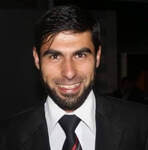
Mohammad Abdul-Jawad Zo’rob, 30
A young Palestinian man died, on Tuesday morning, from complications resulting to wounds he suffered in April of the year 2018, after Israeli soldiers shot him during the Great Return March processions in the Gaza Strip.
His family said their son, Mohammad Abdul-Jawad Zo’rob, 30, from Rafah in the southern part of the Gaza Strip, was shot by Israeli army fire on April 27th, 2018.
They added that he suffered various complications since then, and developed tumors that eventually led to his death, especially amidst the lack of medical supplies in the besieged and impoverished Gaza Strip.
He was shot with an expanding bullet, and underwent several surgeries, but also suffered several infections in the wound area, leading to cancer.
Israeli soldiers have killed 307 Palestinians, including medics and journalists, and injured more than 29000, since the Great Return March procession started in the Gaza Strip, on Palestinian land Day, March 30th, 2018.
A young Palestinian man died, on Tuesday morning, from complications resulting to wounds he suffered in April of the year 2018, after Israeli soldiers shot him during the Great Return March processions in the Gaza Strip.
His family said their son, Mohammad Abdul-Jawad Zo’rob, 30, from Rafah in the southern part of the Gaza Strip, was shot by Israeli army fire on April 27th, 2018.
They added that he suffered various complications since then, and developed tumors that eventually led to his death, especially amidst the lack of medical supplies in the besieged and impoverished Gaza Strip.
He was shot with an expanding bullet, and underwent several surgeries, but also suffered several infections in the wound area, leading to cancer.
Israeli soldiers have killed 307 Palestinians, including medics and journalists, and injured more than 29000, since the Great Return March procession started in the Gaza Strip, on Palestinian land Day, March 30th, 2018.
18 may 2019
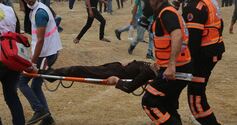
A Palestinian citizen was injured by Israeli gunfire on Saturday during his presence in the east of Khan Younis, south of the Gaza Strip.
According to local sources, the Israeli occupation forces opened fire at a group of citizens east of Khan Younis.
A medical source said that one young citizen suffered a bullet injury in his hand and was rushed to hospital.
According to local sources, the Israeli occupation forces opened fire at a group of citizens east of Khan Younis.
A medical source said that one young citizen suffered a bullet injury in his hand and was rushed to hospital.
Page: 25 - 24 - 23 - 22 - 21 - 20 - 19 - 18 - 17 - 16 - 15 - 14 - 13 - 12 - 11 - 10 - 9 - 8 - 7 - 6 - 5 - 4
Truce violations List of names Pictures of martyrs
Days: Aug: 26 - 25 - 24 - 23 - 22 - 21 - 20 - 19 - 18 - 17 - 16 - 15 - 14 - 13 - 12 - 11 - 10 - 9 - 8 - 7 - 6 - 5 - 4 - 3 - 2 - 1
July: 31 - 30 - 29 - 28 - 27 - 26 - 25 - 24 - 23 - 22 - 21 - 20 - 19 - 18 - 17 - 16 - 15 - 14 - 13 - 12 - 11 - 10 - 9 - 8
